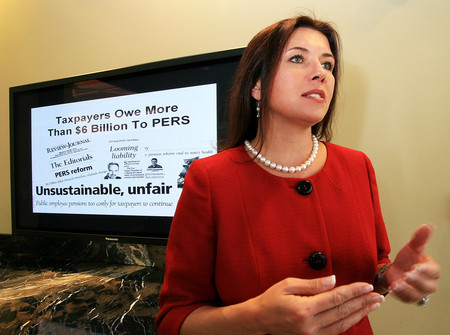Chamber chief recalls her wild ride
Well, you can't say it's a boring job.
When Kara Kelley retires on April 1 as president and chief executive officer of the Las Vegas Chamber of Commerce, she'll have been through it all: nation-leading economic growth, nation-leading economic failure, public tangles with powerful political leaders, punishing fallouts with some of the city's biggest companies and the ignobility of seeing her salary revealed in 40-point type across full-page newspaper ads.
But after a wild decade in charge of the chamber, Kelley will leave having achieved her top goals for the group. As the chamber closes in on a replacement for Kelley, we asked her and other community stakeholders to review her tenure as chamber head, and to discuss what's next for the 6,500-member business group.
For her part, Kelley has a hard time answering when you ask about her chief accomplishments. Running a big chamber of commerce isn't the kind of position that yields opportunities for individual achievement, because it's all about serving a diverse membership with constantly changing needs. And in that, Kelley feels she succeeded: When the local economy thrived, the chamber provided members with unparalleled networking options to benefit from the good times. When recession hit, the organization deftly changed priorities, launching business boot camps and other seminars designed to help members stay open during the downturn.
"It's often difficult for large organizations to be very responsive, and I believe we changed courses smoothly to adapt to what our members were dealing with on a daily basis," she said.
That facile change of direction isn't what made Kelley a household name in the business community, though.
Kelley's high profile on issues including public-sector pay, the minimum wage and water resources for the Las Vegas Valley inserted her and her organization into some pitched public battles with other community advocates. The policy positions the chamber crafted under Kelley's oversight also underpin several major new laws that affect all Nevadans.
Consider the series of studies the chamber commissioned in 2008 to address public-sector salaries. The reports claimed that state workers' benefits diverted tax money from public services to medical costs for retirement benefits, and they noted that Nevada's public employees were among the nation's highest-paid government workers.
The studies drew major fire from unions representing police officers, firefighters and teachers. Labor groups responded with full-page newspaper advertisements pointing to Kelley's $274,000 annual salary and accusing chamber executives and salespeople of making far more than the public workers charged with protecting lives and educating children.
But the chamber's efforts paid off: The Nevada Legislature in 2009 curtailed state employees' retirement benefits to the tune of $142 million a year in the long run.
Kelley also led the chamber in its bruising 2003 fight against a gross-receipts tax on businesses, a battle that pitted the chamber against the city's major resort operators, who supported the levy. The chamber won -- the Legislature dropped the tax from its budget plans and went for a payroll levy instead -- but the group lost big members for its stance, including MGM Mirage and Station Casinos. Resort vendors quit the group, and the Greenspun Corp. and The Howard Hughes Corp. cut their financial support.
Kelley told the Review-Journal in September that she regretted "the divisiveness" of that legislative session.
"At the time, I thought both I and the chamber were trying to keep the lines of communication open with our members and key industries and their constituencies," she said. "We probably could have done a better job with the benefit of hindsight."
Kelley also tangled with Senate Majority Leader Harry Reid, D-Nev., on his support for a higher minimum wage in 2006, and she spoke out against state Sen. Bob Beers' 2006 Tax and Spending Control initiative because it didn't address long-term liabilities for government workers' pay and benefits.
More recently, Kelley steered the chamber through numerous administrative changes, including a move from its Howard Hughes Center headquarters in the middle of town to its new base at Town Square, and a recession-driven employee cut that saw the chamber lay off about 20 percent of its 58-person staff.
Chamber supporters and detractors alike agree that under Kelley, the business group has successfully advanced its members' interests.
Beers, who rejoined the chamber in 2009 when he launched Seale and Beers, Certified Public Accountants, said he's had more agreements than disagreements with the chamber under Kelley's leadership.
"(The chamber) has been as effective an advocate as anybody else in the mosh pit of legislative reality," Beers said. "In the last two years, I've been pleased to see the chamber take up with vigor a number of issues that I was citing as my reasons for TASC (Tax and Spending Control). The chamber has gone on to hire some of the valley's best analysts and experts who have validated what I was saying about the rate of government growth in relation to the growth of the rest of society and our rankings on public-employee compensation compared with other state governments."
But Bob Fulkerson, state director of advocacy group Progressive Leadership Alliance of Nevada, said he thinks Kelley and the chamber were a little too effective.
"I think their single-minded focus on protecting the narrow, selfish interests of big business thwarted a chance to make a major change in tax fairness in the last (2009) legislative session," Fulkerson said. "One reason we have the gross payroll tax as opposed to a more fair, broad-based business tax is because the Las Vegas Chamber of Commerce wanted to stick it to small businesses, and protect the big-business interests that dominate the chamber."
Rusty McAllister, legislative lobbyist for Professional Firefighters of Nevada, also credited the chamber with skillfully promoting its agenda. He called the salary studies a "bomb the chamber dropped" to boost its public profile.
"I think they've advocated their position well, although our personal opinion is that the discussion about public employees' salaries is a diversion for them away from what happened during the tax debate of 2003," McAllister said. "As far as diverting the topic away from themselves and taxes, they did a great job. They said, 'We have plenty of money. We just need to take it from public employees.'"
Similar debates await Kelley's replacement.
Kelley said she fully expects the chamber to continue its efforts on public policies revolving around government accountability and reform, and the 2011 legislative session will carry many of the difficult revenue decisions that 2003 and 2009 brought. The chamber will remain a committed participant in making sure the voice of business is heard as the Legislature makes difficult spending decisions, she said.
Just as importantly, though, the next chamber chief must ensure the chamber plays a "pivotal and central" role in economic recovery, entrepreneurship and job creation, Kelley said.
Beers said he expects the chamber's membership will continue to drive the group's policy positions and actions, regardless of who lands the leadership post.
"There are lots of gatherings of the chamber, and opportunities for people to get involved and express their opinions," he said. "Out of that symphony of opinion comes a direction."
But Fulkerson and McAllister say they hope for a chamber leader willing to hear them out. Nevada's state workers spend a tremendous amount of money with chamber businesses, McAllister said, and that should give any chamber head pause before he or she "rips" on public employees.
Added Fulkerson: "We need somebody who will be here for the long haul, somebody who will recognize that the investments we make today in our educational system and the money we spend on our roads and infrastructure is going to determine what business climate we have 10 or 20 years from now. If we don't make wise spending choices now, business is going to suffer in the long run."
As for Kelley's long-term future, that's up in the air as well.
Kelley said she's "having a lot of very interesting conversations with people," but she hasn't pinned down a post-chamber career. She plans in the short term to spend time with her husband and daughters and visit family around the country.
Kelley said she doesn't covet a high-profile public role, so her next post won't necessarily need the kind of juice she has with the chamber. She's not interested in running for public office, for example.
She expects to have a new situation lined up by the end of 2010.
Despite her pending departure, life at work hasn't slowed for Kelley. She just wrapped up a board retreat at which the group's leaders discussed the chamber's future through 2011 and beyond. She's also assisting in the hunt for her replacement, and she's been preparing for one last go-round with chamber traditions such as its annual Preview event, held every January.
Kelley cops to a little melancholy as her tenure winds down. But looking back on her decision nearly four months ago, she said she has no regrets about leaving.
"This is absolutely the right decision for me. I'm going to be making a career change, and that takes a lot of planning and support from my husband in trying to step away and really look at new opportunities and have some time to evaluate that. I'm excited about what the future may hold."
Contact reporter Jennifer Robison at jrobison@reviewjournal.com or 702-380-4512.
THE SEARCH FOR A REPLACEMENT
The chamber is still accepting applications for Kelley's job, but the group is fairly far along in the search process.
The chamber retained Korn-Ferry International, an executive-placement consulting firm based in Los Angeles, to oversee hiring for the post. More than 80 candidates from across the country showed interest in the job, and Korn-Ferry winnowed that list down to a handful of prospects. The chamber committee that's overseeing the search has narrowed it down even more, selecting a smaller group that it will interview in coming weeks.
Kelley said she expects the search to come down to two or three top candidates within a month. A final decision would come shortly after interviews in that last round.
The idea, said Kelley, is to have the new chief executive seated by mid-March, roughly two weeks before Kelley retires.
Kelley said she'll spend the last couple of weeks of her tenure introducing the new hire to chamber members and volunteers, and otherwise help the new head transition into the position.




























